Unit 12 Life is full of the unexpected Section A课件(共56张PPT,无音频)人教版九年级全一册
文档属性
| 名称 | Unit 12 Life is full of the unexpected Section A课件(共56张PPT,无音频)人教版九年级全一册 |
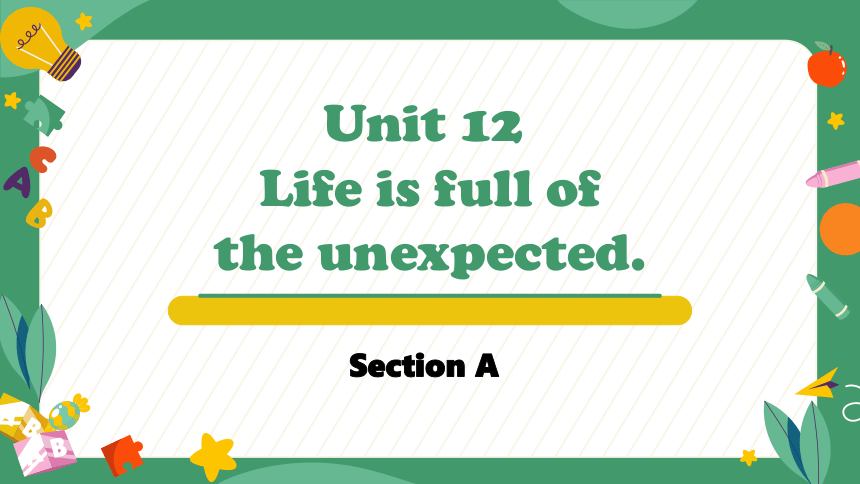
|
|
| 格式 | pptx | ||
| 文件大小 | 2.9MB | ||
| 资源类型 | 教案 | ||
| 版本资源 | 人教新目标(Go for it)版 | ||
| 科目 | 英语 | ||
| 更新时间 | 2024-09-03 21:15:39 | ||
图片预览

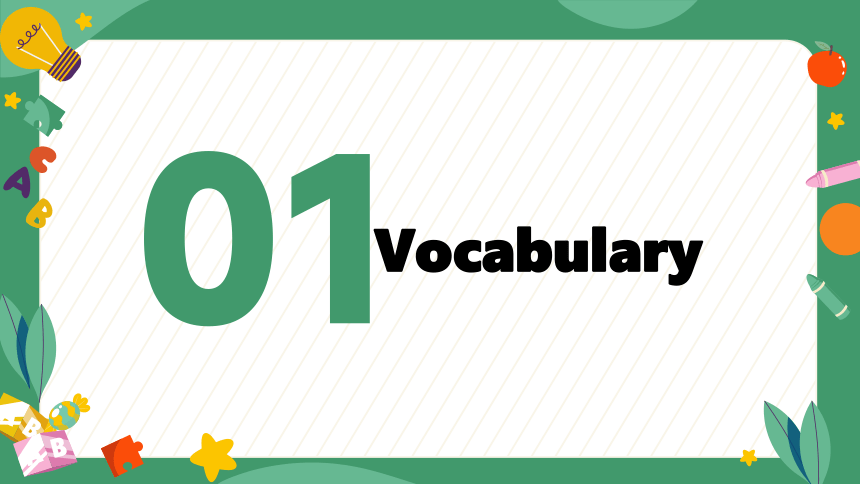

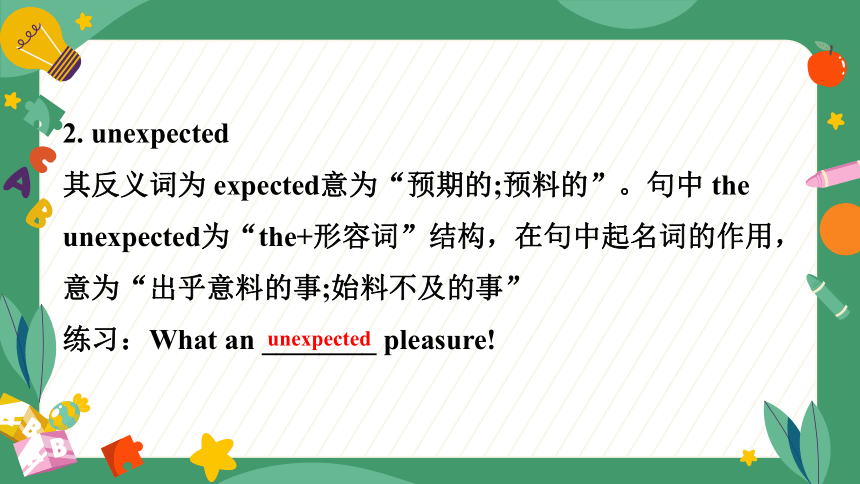
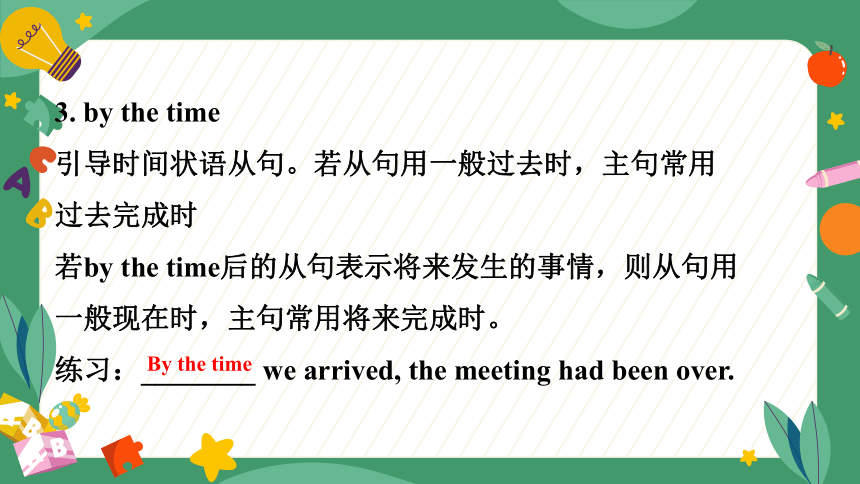
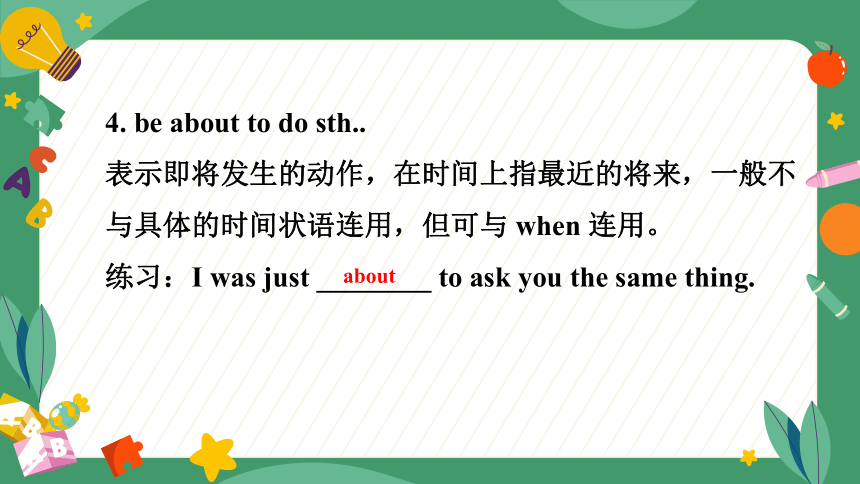
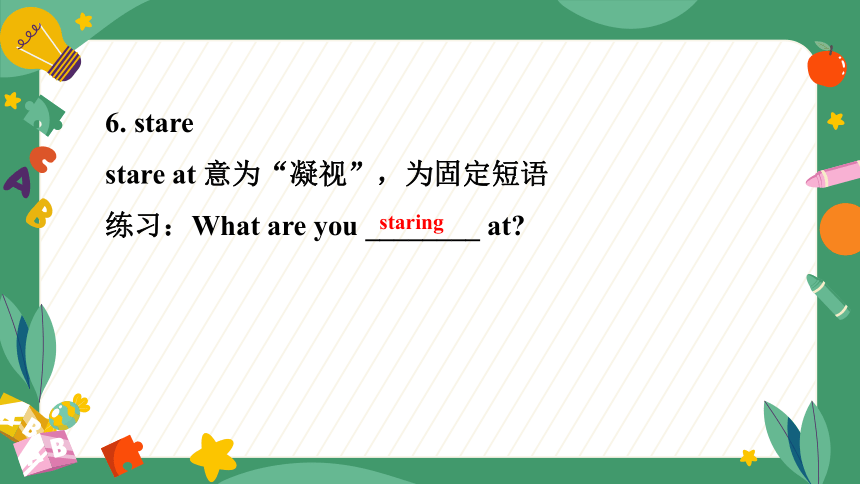
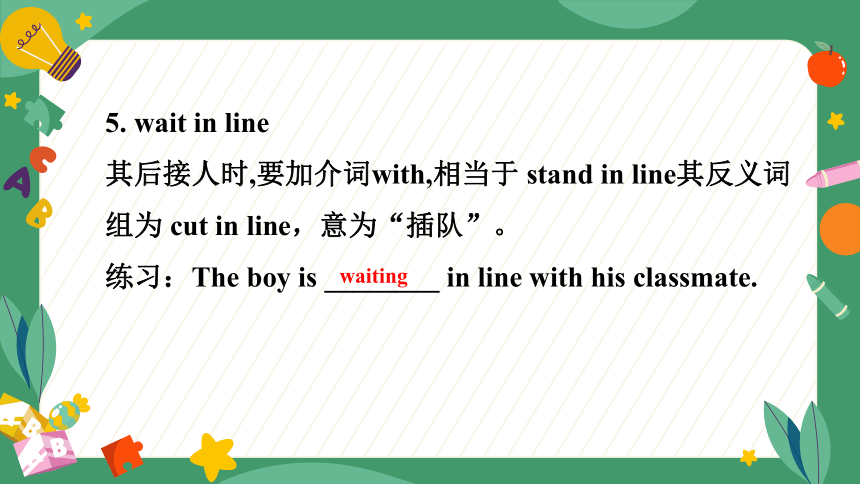
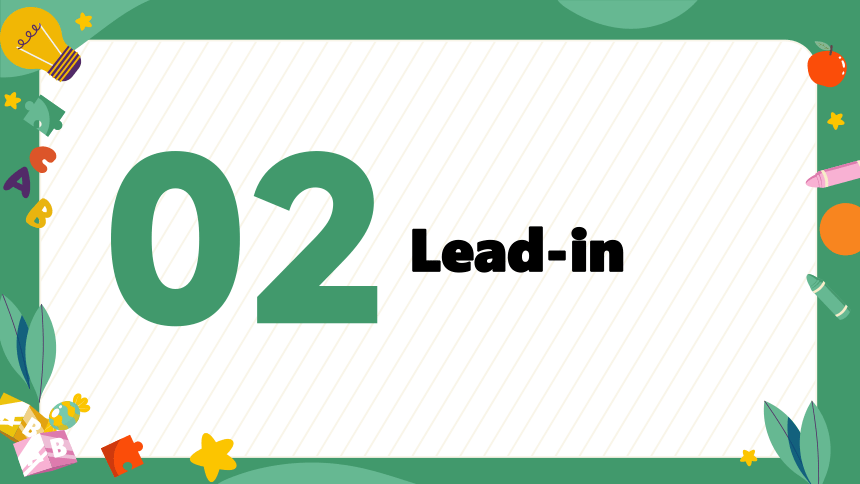
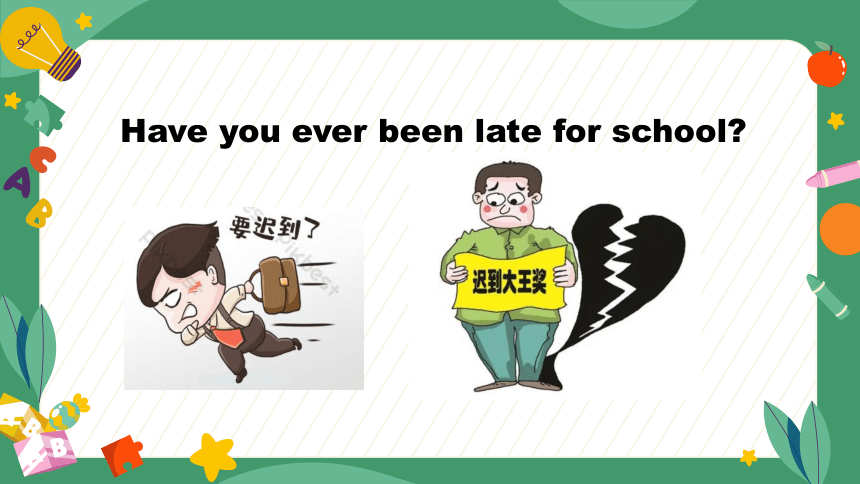
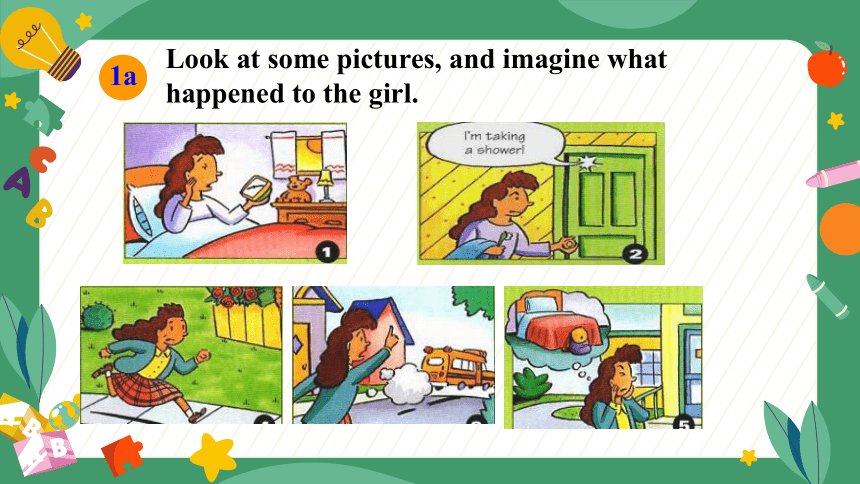
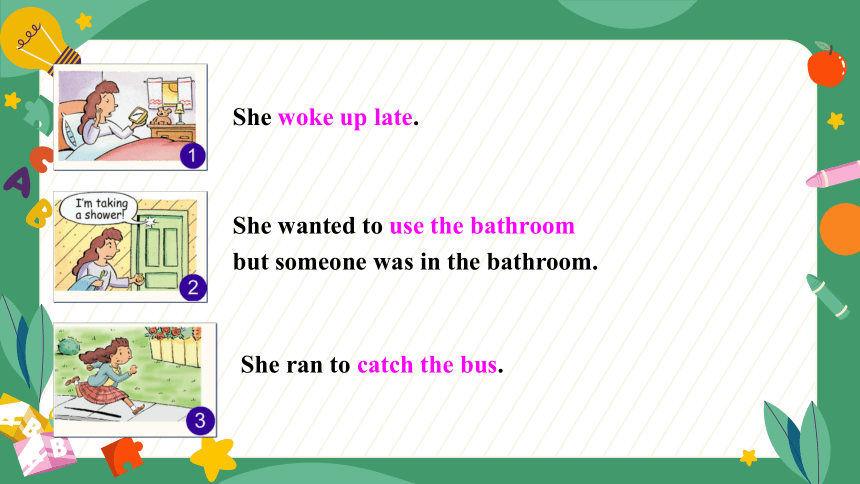
文档简介
(共56张PPT)
Section A
Unit 12
Life is full of
the unexpected.
Vocabulary
01
1. oversleep
其过去式和过去分词均为 overslept。
over-是前缀,表示“太,过于'
练习:He ________ yesterday and was late for school.
overslept
2. unexpected
其反义词为 expected意为“预期的;预料的”。句中 the unexpected为“the+形容词”结构,在句中起名词的作用,意为“出乎意料的事;始料不及的事”
练习:What an ________ pleasure!
unexpected
3. by the time
引导时间状语从句。若从句用一般过去时,主句常用过去完成时
若by the time后的从句表示将来发生的事情,则从句用一般现在时,主句常用将来完成时。
练习:________ we arrived, the meeting had been over.
By the time
4. be about to do sth..
表示即将发生的动作,在时间上指最近的将来,一般不与具体的时间状语连用,但可与 when 连用。
练习:I was just ________ to ask you the same thing.
about
6. stare
stare at 意为“凝视”,为固定短语
练习:What are you ________ at
staring
5. wait in line
其后接人时,要加介词with,相当于 stand in line其反义词组为 cut in line,意为“插队”。
练习:The boy is ________ in line with his classmate.
waiting
Lead-in
02
Have you ever been late for school
1a
Look at some pictures, and imagine what happened to the girl.
She woke up late.
She wanted to use the bathroom but someone was in the bathroom.
She ran to catch the bus.
The bus had just left.
She got to school and realized she had left her backpack at home.
1b
Listen to Mary talking about her plete the sentences.
1. By the time I got up, my brother ____
already ______ in the shower.
2. By the time I got outside, the bus ____
already ____.
3. When I got to school, I realized I ____
____ my backpack at home.
had
gotten
had
left
had
left
1c
Take turns being Mary. Look at the pictures
above and talk about what happened this morning.
What happened
I overslept. By the time I got up, my brother had already gotten in the shower.
2a
Listen to Mary continue her story. Number the pictures [1-4] in the correct order.
1
2
3
4
2b
Fill in the blanks with the correct forms of the verbs in brackets. Then listen again and check your answers.
1. When I ____ (get ) home, I realized I ________
(leave) my keys in the backpack.
2. By the time I ____ (get) back to school, the bell
_________ (ring).
3. By the time I _________ (walk) into class, the
teacher ____________ (start) teaching already.
got
had left
got
had rung
walked
had started
Boy:
Mary:
Boy:
So then what did you do, Mary
Well, I ran home to get my backpack. But when I got home, I realized I had left my keys in the backpack.
You’re kidding!
Mary:
Boy:
Mary:
So I ran back to school without my keys or my backpack. But by the time I got back to school, the bell had rung.
Oh, no!
And by the time I walked into class, the teacher had started teaching already. She asked for our homework, but of course I didn’t have it.
2c
Make up an ending for the story and share it with your partner.
A possible ending
The teacher looked at Mary and asked her if she had finished the homework. Mary told her the unexpected things she met this morning but the teacher thought it couldn’t be true. She was asked to finish the homework in class. What an unforgettable day it is!
2d
Role-play the conversation.
Matt:
Kevin:
Matt:
Kevin:
Why were you late for class today, Kevin
My alarm clock didn’t go off! I kept sleeping, and when I woke up it was already 8:00 a.m.!
Oh, no!
So I just quickly put on some clothes and rushed out of the door.
Matt:
Kevin:
Matt:
Kevin:
Matt:
You didn’t eat breakfast
No, I didn’t even brush my teeth or wash my face! But before I got to the bus stop, the bus had already left.
Then how did you get here
Luckily, Carl’s dad saw me on the street and gave me a lift in his car.
Well, at least by the time you got to school, you were only five minutes late for class.
Read the dialogue and then answer the questions.
1) Why was Kevin late for class
2) How did Kevin get to school
Kevin’s clock didn’t go off. He overslept.
Carl’s dad saw him on the street and gave
him a lift in his car.
Language points
1. By the time I got up, my brother had already
gotten in the shower.
本句是一个由by the time引导的时间状语从句的复合句。by the time意为“到……时,在……以前”,引导时间状语从句,若从句用一般过去时,主句常用过去完成时。
2. When I got home, I realized I had left my keys in the
backpack.
leave在此句中作动词,意为“忘记;丢下”。常见用
法如下:
leave sth. +地点状语 把某物落/忘在某处(地)
leave sb. by oneself 把某人单独留下
3. I kept sleeping, and when I woke up it was
already 8:00 a.m. !
keep doing sth. 强调动作的连续不断,不和表示瞬间动作的动词连用,意思是“一直……”。
4. So I just quickly put on some clothes and rushed
out of the door.
put on 意为“穿上;戴上”,用于穿衣服、穿鞋、戴帽子、戴眼镜等,强调动作。
“9·11事件”又称“911恐怖袭击事件”、“美国911事件”等,指的是美国东部时间2001年9月11日上午(北京时间9月11日晚上)恐怖分子劫持的4架民航客机撞击美国纽约世界贸易中心World Trade Center和华盛顿五角大楼The Pentagon的历史事件。包括美国纽约地标性建筑世界贸易中心双塔在内的6座建筑被完全摧毁,其它23座高层建筑遭到破坏,美国国防部总部所在地五角大楼也遭到袭击。“911”事件是发生在美国本土的最为严重的恐怖攻击行动,遇难者总数高达2996人。
In May 2001, I found a job in New York at the World Trade Center. On September 11, 2001, I arrived at my building at around 8:30 a.m.I was about to go up when I decided to get a coffee first. I went to my favorite coffee place even though it was two blocks east from my office. As I was waiting in line with other office workers, I heard a loud sound. Before I could join the others outside to see what was going on, the first plane had already hit my office building. We stared in disbelief at the black smoke rising above the burning building. I felt lucky to be alive.
Almost 10 years later, I woke up at 10:00 a.m. on February 21, 2011 and realized that my alarm had gone off. I jumped out of bed and went straight to the airport. But by the time I got to the airport, my plane to New Zealand had already taken off. “This is the first holiday I’ve taken in a year, and now I’ve missed my plane. What bad luck!” I thought to myself. The other planes were full so I had to wait till the next day. The next morning, I heard about the earthquake in New Zealand the day before. My bad luck had unexpectedly turned into a good thing.
Read Para.1 carefully and answer the questions.
1.What time did the writer arrive at World Trade Center on September 11, 2001
2.What did the writer decide to do first
3.How far was the coffee place from his office
The writer arrived at World Trade Center at around 8:30 a.m.
The writer decided to get a coffee first.
It was two blocks east from his office.
4.What happened to his office building
5.How did the writer feel after the event happened
It was hit by a plane and black smoke rose above the burning building.
The writer felt lucky to be alive.
Read para. 2 carefully and put the sentences in the right order.
The next morning, I heard about the earthquake in New Zealand the day before.
I woke up at 10:00 a.m. on February 21,2011 and realized that my alarm had never gone off.
By the time I got to the airport, my plane to New Zealand had already taken off.
The other planes were full so I had to wait till the next day.
I jumped out of bed and went straight to the airport.
5
1
3
4
2
3a
Read the passage and answer the questions.
1. Which two events does the writer mention
2. How did the writer end up missing both events
The writer mentions the September 11 attack in New York and the earthquake in New Zealand.
The writer went to get a coffee first and was not in the office when the plane hit the World Trade Center. He/She had overslept and missed his/her flight, so he/she avoided the earthquake.
Language points
1. I was about to go up when I decided to get a coffee first.
be about to do sth.意为“刚要做某事,即将做某事”,表示即将发生的动作,在时间上指最近的将来。
be about to do sth.通常不与具体的时间状语连用,而常与when引导的时间状语从句连用。
eg:I am about to go shopping this weekend.
我这个周末打算去购物。
The new school year is about to begin.
新学年开学在即。
I was about to go to school when it began to rain.
我正打算去学校,突然开始下雨了。
3. We stared in disbelief at the black smoke rising above the burning building.
stare v. 后常接介词at/into,意为“凝视,盯着”,指由于好奇、惊讶、赞叹等原因而瞪大眼睛长时间地、直接地注视,有时含有粗鲁无礼的意思。
look at指集中注意力地看,是有意的,强调“看”的动作。
in disbelief 不相信 ,疑惑, 怀疑
e.g. I told my son to stop staring at that fat woman;it wasn't polite.
我告诉儿子不要再盯着那个胖女人看,那样不礼貌。
e.g. Look at the map, and you can find where Shanghai is.
看这张地图,你就能够找到上海在哪儿。
e.g. She looked at him in disbelief.
她全然不信地看着他。
above prep.
1)(表示位置)在……正上方;高于”(与 below相对)。
2) 表示在地位、级别、能力、资历、重要性等方面“超过”、“在……之上”、“比……强”。
注意:on, over与above都可以表示“在……上”。
on常表示一个物体在另一个物体的表面上,两个物体相互接触。
over常表示一个物体在另一个物体的垂直上方,两个物体相互不接触,反义词为under。
above常笼统地表示一个物体高于另一个物
体,反义词为below。
3b
Find words from the passage with opposite meanings to the words below.
1. lost:
2. west:
3. below:
4. dead:
5. empty:
found
east
above
alive
full
Write a sentence with each word.
1. I found the money on the floor.
2. The sun rises in the east.
3. There was a large bird flying above us.
4. His family was so happy to hear he was still alive.
5. The train was so full that I couldn’t get on it at all.
3c
Retell one of the events to your partner. Use these words and phrases to help you.
stare, in disbelief, take off, unexpected, burn, above, alive, till / until, arrive at, be about to, even though
e.g. On September 11, 2001, I arrived at my building in the morning and was about to enter the office building, when suddenly I decided to buy a coffee. The unexpected thing came about when I was waiting in the line that a plane crashed the office building where I work. People were staring at the burning plane in disbelief. How dangerous it was!
Grammar Focus
过去完成时
1、过去完成时的意义
过去完成时表示在过去某个时间或某个动作之前发生的动作或存在的状态,它表示动作发生的时间是“过去的过去”,它是一种相对于一般过去时的时态,没有一般过去时就没有过去完成时
2、过去完成时的句式变化
肯定句:主语+had+过去分词+其他
否定句:主语+had+not+过去分词+其他
般疑问句: Had+主语+过去分词+其他
肯定回答Yes,主语+had.
否定回答 No,主语+hadn't.
3、过去完成时的用法
(1)表示一个动作或状态在过去某一时间或动作之前已经完成,即发生在“过去的过去”。这个过去的时间可以用 by, before 等介词短语或者一个时间状语从句来表示。
例: When I woke up, it had stopped raining.我醒来时,雨已经停了
(2)表示某一动作或状态在过去某时之前已经开始,一直延续到这一过去的时间常与表示延续的时间状语连用,如"by the end of+过去的时间点","by the time+从句(一般过去时)"等
例: By the end of last term, we had learned 5,000 new words
到上个学期为止,我们已经学了 5000个新单词
The bus had already left by the time I got there.
到我到那儿时,公共汽车已经离开了
4、过去完成时的判断依据
(1)由时间状语来判定
一般来说,各种时态都有特定的时间状语。与过去完成时连用的时间状语有by+过去的时间点
例: He had finished reading the book by 10 o'clock yesterday.
到昨天10点钟时,他已经读完了这本书。
by the end of+过去的时间点
例: By the end of last year, she had worked in the factory for twenty years
到去年年底,她已经在这家工厂工作20年了
知识拓展
在含有 before,after引导的时间状语从句的复合句中,由于 before和 after本身已表达了动作的先后关系,若主、从句表示的动作紧密相连,则主、从句都可用一般过去时
例:After she closed the door she left the class-room.她关好门后,离开了教室。
表示意向的动词,如hope,wish,expect,think,intend,mean,suppose等,用过去完成时表示“原本......,但未能...... ”
例: We had hoped that you would come, but you didn't.
我们本希望你能来,但你没来。
(3)根据上下文来判定
例: I met Tom in the street yesterday. We hadn't seen each other since he went to shanghai.我昨天在街上碰见了汤姆。自从他去上海后,我们还没有见过面。
1.He _______ to play the piano before he was 10 years old .
A. has learned B. learned C. learns D. had learned
2.Seven told me that he _____ writing the report a week before.
A. finish B. finishes C. finishing D. had finished
3.By the end of last term, they ________ over 2,000 English words.
A. learned B. has learned C. had learned D. learn
4.By the time my parents reached home yesterday, I _____ the dinner already.
A. had cooked B. cooked C. have cooked D. was cooked
5.—You look unhappy, what happened
—Bad luck. I planned to go to Shenzhen, but the plane ________ when I ________ at the airport.
A. has left; arrived B. had left; arrived C. left; arrives
4a
Make sentences using by the time or before.
1. Tim went into the bathroom. Mary got up.
By the time Mary got up, Tim had already
gone into the bathroom.
2. The coffee became cold. I put cream (n. 奶
油) in the coffee.
__________________________________
__________________________________
Before I put cream in the coffee, the coffee had become cold.
3. The teacher collected the math homework. I got to school.
__________________________________
__________________________________
4. I completed the work for my boss. The workday (n. 工作日) ended.
__________________________________
__________________________________
By the time I got to school, the teacher had collected the math homework.
I had completed the work for my boss before the workday ended.
5. The movie started. I arrived at the cinema.
__________________________________
__________________________________
6. My mother finished making the apple pie
(n. 果馅派). I got home from my language
course.
___________________________________
___________________________________
___________________________________
The movie had started before I arrived at the cinema.
By the time I got home from my language course, my mother had finished making the apple pie.
4b
Fill in the blanks with the correct forms of the words in the box.
rush out, forget, arrive at, go into,
show up, find out
1. By the time I arrived at the party, everyone else _____ already __________.
2. When he put the noodles into a bowl, he realized he ____________ to add the green beans (n. 豆).
had
shown up
had forgotten
3. By the time my mother came back from the market (n. 市场), I ____ already __________ of the door to go to my piano lesson.
4. Before she got to the airport, she ____________ about the earthquake.
had
rushed out
had found out
5. When she _________ the movie theater, she remembered she had forgotten to feed her dog.
6. Before she got a chance to say goodbye, he ____________ the building.
arrived at
had gone into
4c
Write two true statements and one false statement about your day yesterday. Then ask your classmates to guess the false statement.
1. By the time I left for school in the morning, __________________________________
__________________________________
I had already had breakfast.
I had already had my hair cut.
2. By the end of the school day,
__________________________________
__________________________________
__________________________________
3. By dinner time, I_________________________________
I_________________________________
I_________________________________
I had finished my homework.
I had gotten a present from Tom.
I had had these articles read.
had had too many apples.
had eaten plenty of meat.
had finished all the housework.
Thank you!
Section A
Unit 12
Life is full of
the unexpected.
Vocabulary
01
1. oversleep
其过去式和过去分词均为 overslept。
over-是前缀,表示“太,过于'
练习:He ________ yesterday and was late for school.
overslept
2. unexpected
其反义词为 expected意为“预期的;预料的”。句中 the unexpected为“the+形容词”结构,在句中起名词的作用,意为“出乎意料的事;始料不及的事”
练习:What an ________ pleasure!
unexpected
3. by the time
引导时间状语从句。若从句用一般过去时,主句常用过去完成时
若by the time后的从句表示将来发生的事情,则从句用一般现在时,主句常用将来完成时。
练习:________ we arrived, the meeting had been over.
By the time
4. be about to do sth..
表示即将发生的动作,在时间上指最近的将来,一般不与具体的时间状语连用,但可与 when 连用。
练习:I was just ________ to ask you the same thing.
about
6. stare
stare at 意为“凝视”,为固定短语
练习:What are you ________ at
staring
5. wait in line
其后接人时,要加介词with,相当于 stand in line其反义词组为 cut in line,意为“插队”。
练习:The boy is ________ in line with his classmate.
waiting
Lead-in
02
Have you ever been late for school
1a
Look at some pictures, and imagine what happened to the girl.
She woke up late.
She wanted to use the bathroom but someone was in the bathroom.
She ran to catch the bus.
The bus had just left.
She got to school and realized she had left her backpack at home.
1b
Listen to Mary talking about her plete the sentences.
1. By the time I got up, my brother ____
already ______ in the shower.
2. By the time I got outside, the bus ____
already ____.
3. When I got to school, I realized I ____
____ my backpack at home.
had
gotten
had
left
had
left
1c
Take turns being Mary. Look at the pictures
above and talk about what happened this morning.
What happened
I overslept. By the time I got up, my brother had already gotten in the shower.
2a
Listen to Mary continue her story. Number the pictures [1-4] in the correct order.
1
2
3
4
2b
Fill in the blanks with the correct forms of the verbs in brackets. Then listen again and check your answers.
1. When I ____ (get ) home, I realized I ________
(leave) my keys in the backpack.
2. By the time I ____ (get) back to school, the bell
_________ (ring).
3. By the time I _________ (walk) into class, the
teacher ____________ (start) teaching already.
got
had left
got
had rung
walked
had started
Boy:
Mary:
Boy:
So then what did you do, Mary
Well, I ran home to get my backpack. But when I got home, I realized I had left my keys in the backpack.
You’re kidding!
Mary:
Boy:
Mary:
So I ran back to school without my keys or my backpack. But by the time I got back to school, the bell had rung.
Oh, no!
And by the time I walked into class, the teacher had started teaching already. She asked for our homework, but of course I didn’t have it.
2c
Make up an ending for the story and share it with your partner.
A possible ending
The teacher looked at Mary and asked her if she had finished the homework. Mary told her the unexpected things she met this morning but the teacher thought it couldn’t be true. She was asked to finish the homework in class. What an unforgettable day it is!
2d
Role-play the conversation.
Matt:
Kevin:
Matt:
Kevin:
Why were you late for class today, Kevin
My alarm clock didn’t go off! I kept sleeping, and when I woke up it was already 8:00 a.m.!
Oh, no!
So I just quickly put on some clothes and rushed out of the door.
Matt:
Kevin:
Matt:
Kevin:
Matt:
You didn’t eat breakfast
No, I didn’t even brush my teeth or wash my face! But before I got to the bus stop, the bus had already left.
Then how did you get here
Luckily, Carl’s dad saw me on the street and gave me a lift in his car.
Well, at least by the time you got to school, you were only five minutes late for class.
Read the dialogue and then answer the questions.
1) Why was Kevin late for class
2) How did Kevin get to school
Kevin’s clock didn’t go off. He overslept.
Carl’s dad saw him on the street and gave
him a lift in his car.
Language points
1. By the time I got up, my brother had already
gotten in the shower.
本句是一个由by the time引导的时间状语从句的复合句。by the time意为“到……时,在……以前”,引导时间状语从句,若从句用一般过去时,主句常用过去完成时。
2. When I got home, I realized I had left my keys in the
backpack.
leave在此句中作动词,意为“忘记;丢下”。常见用
法如下:
leave sth. +地点状语 把某物落/忘在某处(地)
leave sb. by oneself 把某人单独留下
3. I kept sleeping, and when I woke up it was
already 8:00 a.m. !
keep doing sth. 强调动作的连续不断,不和表示瞬间动作的动词连用,意思是“一直……”。
4. So I just quickly put on some clothes and rushed
out of the door.
put on 意为“穿上;戴上”,用于穿衣服、穿鞋、戴帽子、戴眼镜等,强调动作。
“9·11事件”又称“911恐怖袭击事件”、“美国911事件”等,指的是美国东部时间2001年9月11日上午(北京时间9月11日晚上)恐怖分子劫持的4架民航客机撞击美国纽约世界贸易中心World Trade Center和华盛顿五角大楼The Pentagon的历史事件。包括美国纽约地标性建筑世界贸易中心双塔在内的6座建筑被完全摧毁,其它23座高层建筑遭到破坏,美国国防部总部所在地五角大楼也遭到袭击。“911”事件是发生在美国本土的最为严重的恐怖攻击行动,遇难者总数高达2996人。
In May 2001, I found a job in New York at the World Trade Center. On September 11, 2001, I arrived at my building at around 8:30 a.m.I was about to go up when I decided to get a coffee first. I went to my favorite coffee place even though it was two blocks east from my office. As I was waiting in line with other office workers, I heard a loud sound. Before I could join the others outside to see what was going on, the first plane had already hit my office building. We stared in disbelief at the black smoke rising above the burning building. I felt lucky to be alive.
Almost 10 years later, I woke up at 10:00 a.m. on February 21, 2011 and realized that my alarm had gone off. I jumped out of bed and went straight to the airport. But by the time I got to the airport, my plane to New Zealand had already taken off. “This is the first holiday I’ve taken in a year, and now I’ve missed my plane. What bad luck!” I thought to myself. The other planes were full so I had to wait till the next day. The next morning, I heard about the earthquake in New Zealand the day before. My bad luck had unexpectedly turned into a good thing.
Read Para.1 carefully and answer the questions.
1.What time did the writer arrive at World Trade Center on September 11, 2001
2.What did the writer decide to do first
3.How far was the coffee place from his office
The writer arrived at World Trade Center at around 8:30 a.m.
The writer decided to get a coffee first.
It was two blocks east from his office.
4.What happened to his office building
5.How did the writer feel after the event happened
It was hit by a plane and black smoke rose above the burning building.
The writer felt lucky to be alive.
Read para. 2 carefully and put the sentences in the right order.
The next morning, I heard about the earthquake in New Zealand the day before.
I woke up at 10:00 a.m. on February 21,2011 and realized that my alarm had never gone off.
By the time I got to the airport, my plane to New Zealand had already taken off.
The other planes were full so I had to wait till the next day.
I jumped out of bed and went straight to the airport.
5
1
3
4
2
3a
Read the passage and answer the questions.
1. Which two events does the writer mention
2. How did the writer end up missing both events
The writer mentions the September 11 attack in New York and the earthquake in New Zealand.
The writer went to get a coffee first and was not in the office when the plane hit the World Trade Center. He/She had overslept and missed his/her flight, so he/she avoided the earthquake.
Language points
1. I was about to go up when I decided to get a coffee first.
be about to do sth.意为“刚要做某事,即将做某事”,表示即将发生的动作,在时间上指最近的将来。
be about to do sth.通常不与具体的时间状语连用,而常与when引导的时间状语从句连用。
eg:I am about to go shopping this weekend.
我这个周末打算去购物。
The new school year is about to begin.
新学年开学在即。
I was about to go to school when it began to rain.
我正打算去学校,突然开始下雨了。
3. We stared in disbelief at the black smoke rising above the burning building.
stare v. 后常接介词at/into,意为“凝视,盯着”,指由于好奇、惊讶、赞叹等原因而瞪大眼睛长时间地、直接地注视,有时含有粗鲁无礼的意思。
look at指集中注意力地看,是有意的,强调“看”的动作。
in disbelief 不相信 ,疑惑, 怀疑
e.g. I told my son to stop staring at that fat woman;it wasn't polite.
我告诉儿子不要再盯着那个胖女人看,那样不礼貌。
e.g. Look at the map, and you can find where Shanghai is.
看这张地图,你就能够找到上海在哪儿。
e.g. She looked at him in disbelief.
她全然不信地看着他。
above prep.
1)(表示位置)在……正上方;高于”(与 below相对)。
2) 表示在地位、级别、能力、资历、重要性等方面“超过”、“在……之上”、“比……强”。
注意:on, over与above都可以表示“在……上”。
on常表示一个物体在另一个物体的表面上,两个物体相互接触。
over常表示一个物体在另一个物体的垂直上方,两个物体相互不接触,反义词为under。
above常笼统地表示一个物体高于另一个物
体,反义词为below。
3b
Find words from the passage with opposite meanings to the words below.
1. lost:
2. west:
3. below:
4. dead:
5. empty:
found
east
above
alive
full
Write a sentence with each word.
1. I found the money on the floor.
2. The sun rises in the east.
3. There was a large bird flying above us.
4. His family was so happy to hear he was still alive.
5. The train was so full that I couldn’t get on it at all.
3c
Retell one of the events to your partner. Use these words and phrases to help you.
stare, in disbelief, take off, unexpected, burn, above, alive, till / until, arrive at, be about to, even though
e.g. On September 11, 2001, I arrived at my building in the morning and was about to enter the office building, when suddenly I decided to buy a coffee. The unexpected thing came about when I was waiting in the line that a plane crashed the office building where I work. People were staring at the burning plane in disbelief. How dangerous it was!
Grammar Focus
过去完成时
1、过去完成时的意义
过去完成时表示在过去某个时间或某个动作之前发生的动作或存在的状态,它表示动作发生的时间是“过去的过去”,它是一种相对于一般过去时的时态,没有一般过去时就没有过去完成时
2、过去完成时的句式变化
肯定句:主语+had+过去分词+其他
否定句:主语+had+not+过去分词+其他
般疑问句: Had+主语+过去分词+其他
肯定回答Yes,主语+had.
否定回答 No,主语+hadn't.
3、过去完成时的用法
(1)表示一个动作或状态在过去某一时间或动作之前已经完成,即发生在“过去的过去”。这个过去的时间可以用 by, before 等介词短语或者一个时间状语从句来表示。
例: When I woke up, it had stopped raining.我醒来时,雨已经停了
(2)表示某一动作或状态在过去某时之前已经开始,一直延续到这一过去的时间常与表示延续的时间状语连用,如"by the end of+过去的时间点","by the time+从句(一般过去时)"等
例: By the end of last term, we had learned 5,000 new words
到上个学期为止,我们已经学了 5000个新单词
The bus had already left by the time I got there.
到我到那儿时,公共汽车已经离开了
4、过去完成时的判断依据
(1)由时间状语来判定
一般来说,各种时态都有特定的时间状语。与过去完成时连用的时间状语有by+过去的时间点
例: He had finished reading the book by 10 o'clock yesterday.
到昨天10点钟时,他已经读完了这本书。
by the end of+过去的时间点
例: By the end of last year, she had worked in the factory for twenty years
到去年年底,她已经在这家工厂工作20年了
知识拓展
在含有 before,after引导的时间状语从句的复合句中,由于 before和 after本身已表达了动作的先后关系,若主、从句表示的动作紧密相连,则主、从句都可用一般过去时
例:After she closed the door she left the class-room.她关好门后,离开了教室。
表示意向的动词,如hope,wish,expect,think,intend,mean,suppose等,用过去完成时表示“原本......,但未能...... ”
例: We had hoped that you would come, but you didn't.
我们本希望你能来,但你没来。
(3)根据上下文来判定
例: I met Tom in the street yesterday. We hadn't seen each other since he went to shanghai.我昨天在街上碰见了汤姆。自从他去上海后,我们还没有见过面。
1.He _______ to play the piano before he was 10 years old .
A. has learned B. learned C. learns D. had learned
2.Seven told me that he _____ writing the report a week before.
A. finish B. finishes C. finishing D. had finished
3.By the end of last term, they ________ over 2,000 English words.
A. learned B. has learned C. had learned D. learn
4.By the time my parents reached home yesterday, I _____ the dinner already.
A. had cooked B. cooked C. have cooked D. was cooked
5.—You look unhappy, what happened
—Bad luck. I planned to go to Shenzhen, but the plane ________ when I ________ at the airport.
A. has left; arrived B. had left; arrived C. left; arrives
4a
Make sentences using by the time or before.
1. Tim went into the bathroom. Mary got up.
By the time Mary got up, Tim had already
gone into the bathroom.
2. The coffee became cold. I put cream (n. 奶
油) in the coffee.
__________________________________
__________________________________
Before I put cream in the coffee, the coffee had become cold.
3. The teacher collected the math homework. I got to school.
__________________________________
__________________________________
4. I completed the work for my boss. The workday (n. 工作日) ended.
__________________________________
__________________________________
By the time I got to school, the teacher had collected the math homework.
I had completed the work for my boss before the workday ended.
5. The movie started. I arrived at the cinema.
__________________________________
__________________________________
6. My mother finished making the apple pie
(n. 果馅派). I got home from my language
course.
___________________________________
___________________________________
___________________________________
The movie had started before I arrived at the cinema.
By the time I got home from my language course, my mother had finished making the apple pie.
4b
Fill in the blanks with the correct forms of the words in the box.
rush out, forget, arrive at, go into,
show up, find out
1. By the time I arrived at the party, everyone else _____ already __________.
2. When he put the noodles into a bowl, he realized he ____________ to add the green beans (n. 豆).
had
shown up
had forgotten
3. By the time my mother came back from the market (n. 市场), I ____ already __________ of the door to go to my piano lesson.
4. Before she got to the airport, she ____________ about the earthquake.
had
rushed out
had found out
5. When she _________ the movie theater, she remembered she had forgotten to feed her dog.
6. Before she got a chance to say goodbye, he ____________ the building.
arrived at
had gone into
4c
Write two true statements and one false statement about your day yesterday. Then ask your classmates to guess the false statement.
1. By the time I left for school in the morning, __________________________________
__________________________________
I had already had breakfast.
I had already had my hair cut.
2. By the end of the school day,
__________________________________
__________________________________
__________________________________
3. By dinner time, I_________________________________
I_________________________________
I_________________________________
I had finished my homework.
I had gotten a present from Tom.
I had had these articles read.
had had too many apples.
had eaten plenty of meat.
had finished all the housework.
Thank you!
同课章节目录
- Unit 1 How can we become good learners.
- Section A
- Section B
- Unit 2 I think that mooncakes are delicious!
- Section A
- Section B
- Unit 3 Could you please tell me where the restroom
- Section A
- Section B
- Unit 4 I used to be afraid of the dark.
- Section A
- Section B
- Unit 5 What are the shirts made of?
- Section A
- Section B
- Review of Units 1-5
- Unit 6 When was it invented?
- Section A
- Section B
- Unit 7 Teenagers should be allowed to choose their
- Section A
- Section B
- Unit 8 It must belong to Carla.
- Section A
- Section B
- Unit 9 I like music that I can dance to.
- Section A
- Section B
- Unit 10 You're supposed to shake hands.
- Section A
- Section B
- Review of Units 6-10
- Unit 11 Sad movies make me cry.
- Section A
- Section B
- Unit 12 Life is full of the unexpected
- Section A
- Section B
- Unit 13 We're trying to save the earth!
- Section A
- Section B
- Unit 14 I remember meeting all of you in Grade 7.
- Section A
- Section B
- Review of Units 11-14
